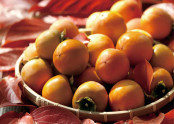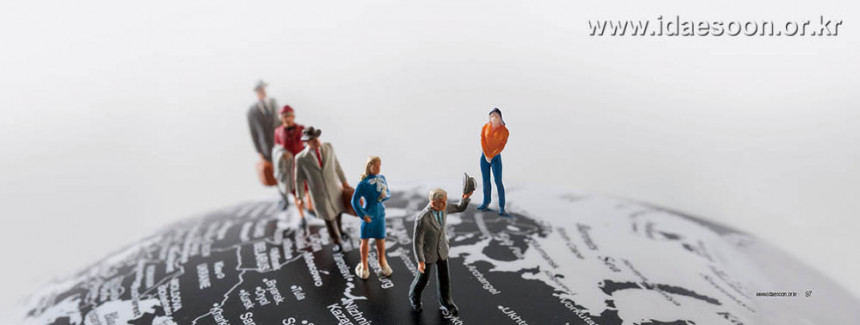도문소자가 되어 세계포덕을 꿈꾸다(영문판)
페이지 정보
작성자 Ara Lee 작성일2018.08.23 조회4,442회 댓글0건본문
Making a Contribution
towards Spreading Sangje’s Dao
thoughout the Wolrd 01
Seonsa*, Ara Lee
Ibegan my cultivation in 2008 during my first visit to Korea since I had immigrated to the US in 1997. My father was Buddhist and my mother was Catholic. At the time, I mainly spoke English and my Korean was only mediocre. My major was in Asian Art History. Throughout my studies, I became interested in eastern philosophy and its deep understanding of the metaphysical world. During my stay in Korea, when I was asked if I was interested in resolving the grievances affecting my family and improving our karma, I agreed to do it wholeheartedly. I wore a beautiful traditional Korean dress (Hanbok) and participated in the ‘Ipdo-chiseong’ (I was told then that it was an initiation ceremony which marks the beginning point of the resolution of our karma and enables initiates to receive blessings through their sincere dedication and by offering of food to God, the great deities of Heaven and Earth as well as my ancestors). I had been sensitive ever since I was little. I had read a lot about spiritual experiences and wondered about my past lives. Understanding the principles of energy and the universe helped me realize a lot about my past lives, my family and my karma.
As a child, I had often wondered about the world and all of its pain and suffering. Why would God not do anything about this if He existed? From the perspective of most religious teachings, I felt the world was unfair, and to be condemned for not having faith was likewise absurd. There was always something lacking; something missing which needed to be addressed. At long last, when I came to understand Sangje*’s Cheonji-gongsa (Work of Reordering the Universe), it radically opened up my view of the world. Learning about the ‘Reordering of the Universe’ helped me realize that I had been ignorant of my blessings and the grace of Heaven. From 1901 to 1909, Sangje made efforts to resolve the grievances which plagued the universe, and He opened up a path for the salvation of humankind through this resolution of grievances. I was grateful I had been given the opportunity to understand and participate in Sangje’s Cheonji-gongsa.
Shortly thereafter, I began wondering why these teachings were not available in the western world. Like a pearl hidden in a mollusk shell, the wisdom of Dao has been handed down from mentor to mentee. I understood that one’s karma can stand in the way of understanding the true meanings of Dao, but I felt certain that many Westerners have connections to Dao from their previous lives.
I have mainly practiced Dao in the US. Many Americans from diverse backgrounds and ancestry lines are cultivating Dao in the US. There are Europeans, Asians, Middle Easterners, Africans, South Americans and Latin Americans who cultivate and share their understanding of Dao. They come from diverse religious backgrounds ranging from Abrahamic faiths (Christianity, Judaism, and Islam) to Asian spiritual beliefs (Buddhism, Hinduism) as well as Atheists. Many seek to find peace in their mind and body, some cultivate Dao to repair their family’s karma and some seek enlightenment. In spite of differences in race and language, Dao can be universally understood because the understanding of Dao is heartfelt and develops as one ripens in the practice of Dao. In Dao, we are all united as one family under heaven.
Among this large group, there is a Seonmu* of a Peruvian descent. Many of his family members suffered from bi-polar disorder. His brother, after an emotional breakdown, would often engage in drunk driving despite the risks involved and the danger this put his daughter in when she traveled with him. They suffered greatly due to the emotional trauma and stress this was causing. The Seonmu began a hundred day dedication for his family. Due to this practice, his family was able to find peace and several of his family members later participated in the Ipdo-chiseong.
Many people report having felt or seen their ancestors while they participated in this ceremony. In one case, a Seonmu of Nicaraguan descent was worried because she was not able to conceive a child. Even though she exerted herself in reflection and prayer, these efforts proved unsuccessful. She knew that only a great act of dedication could allow her to resolve her karma. She thereby made up her mind to go on a pilgrimage in Korea to Sangje’s birthplace as well as the sites of His Cheonji-gongsa. Afterwards while engaged in Gido (reciting prayerful incantations) in Korea, she saw her great grandmother who encouraged her to cultivate diligently. Her great grandmother reassured her not to worry and further told her that her ancestors were all there to support and guide her through her cultivation.
Sangje’s teachings are universal. Often the hardships we go through in life have answers which are contained within the passages of the Jeon-gyeong. A Naesu* of European descent had suffered greatly because of unfair circumstances at work. She lost her job numerous times and was constantly yelled at and bullied. Later on, she read Gyobeop chapter 2 verse 28 from the Jeon-gyeong which reads as follows:
When Kim Hyeong-ryeol was on his way home, he crossed paths with Kim Joong-gu a Christian follower, who was excessively drunk at the time. Kim Joong-gu grabbed Kim Hyeong-ryeol and ruthlessly insulted him. Having suffered this severe insult, he returned and truthfully informed Sangje about what had transpired. Thus Sangje said to Hyeong-ryeol, “Fill a bowl with fresh water and reflect on your mistakes.” Hyeong-ryeol did as he had been ordered. After a while, Kim Joong-gu became sick and found himself upon the brink of death. Hearing this news from Hyeong-ryeol, Sangje advised him, “From now on, if this should happen again, do not hold a grudge against the other party. Instead, reflect upon yourself first. If it is your mistake, your mistakes will gain resolution. If it is not your mistake, then the poisonous energy will return to wherever it had come from originally.”
It was hard for her to accept that she had done something wrong. She had been severely wronged and greatly hurt by this pattern that kept on repeating in her life. But through understanding the way of Cheok spirits* as well as understanding how Sangje resolved the karma of His disciples, she was able to reflect deeply upon her karma and what she might have done to accidentally invite such hardship. When she reflected and prayed in her heart to Sangje, she suddenly saw herself yelling and bullying others out of jealousy in a past life. She was surprised by this and found herself able to reflect on her karma. After sincerely reflecting in this manner, her co-workers stopped bullying her and her boss stopped yelling at her. She was greatly moved and decided to cultivate herself with all her heart and mind.
Many millennials I have met have faced depression and anxiety as well as drug addiction. Often times, our various methods of cultivation have helped them understand the root of their karma and why they had sought out destructive habits while trying to find peace in their hearts. Sangje’s teachings greatly move the hearts of such people as well as deepen their understanding of themselves. I think all understanding begins with self-understanding and from this grounding we are then able to understand others and the world around us. As previously stated, many who have dedicated their hearts with sincerity have been able to overcome their addictions and greatly reflect on the pains they may have incurred in both their present and previous incarnations. After deep contemplation, many have gained profound insights regarding their past lives and family karma.
Just as grievances exist for humanity as a collective, I think there are many forms of suffering that many people go through in life as individuals. Regardless of race, language and background, many have found profound understanding and gratitude through the teachings of Sangje (the Supreme Being), Doju* (the Master of Dao) as well as Dojeon* (the Leader of Daesoonjinrohe). Thriving from within this immense well of gratitude, I aim to pay forward these blessings which have optimized my life. I hope others will join me, so we can truly spread the teachings of Dao all over the world.
*Sangje: an ancient name for the Supreme Being (or God) in East Asian religious traditions. Kang Jeungsan (1871~1909) is addressed as ‘Sangje-nim’ in Korean.
*Seonsa: the name of a position within the fellowship system (kind of hierarchy) which designates someone as being in charge of propagation by helping and supervising Seonmus.
*Seonmu: the name of a position within the fellowship system (kind of hierarchy) which designates someone as being in charge of propagation.
*Naesu: the name of a position within the fellowship system (kind of hierarchy) for female general members.
*Cheok spirits: Cheok is an emotional grudge that one person harbors against another. Since these emotions are the effect of grudge-harborer’s spirit, it is also known as a ‘Cheok spirit’.
*Doju: the honorific title for Jo Jeongsan (1895~1958) who created the ways of cultivation as the founder of Mugeukdo, a religion from which Daesoon Jinrihoe later stemmed. He is normally addressed as ‘Doju-nim’ or ‘Okwangsangje-nim’ in Korean.
*Dojeon: the honorific title for Park Wudang (1917~1996) who established Daesoon Jinrihoe. He is addressed as ‘Dojeon-nim’ in Korean.
01 The essay was originally written in English for non-Korean English speakers, whereas the Korean version which appears on the previous page was translated for Koreans. For this reason, the two essays are slightly different in terms of content and expressions. As a bilingual, the author wrote these essays to sound natural and match the cultural conventions of her two intended audiences.
댓글목록
등록된 댓글이 없습니다.



